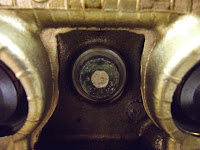It's been a very frustrating day.
As you may recall, my current car project is replacing the head gaskets on my '98 Subaru Legacy Outback. For the most part, the project has been quite fun. Challenging, but mostly fun. That is to say, several difficulties have arisen, but none have been insurmountable, the type of crises for which it would be necessary for me to cry 'Uncle!' and call in a real mechanic to fix what I had messed up.
A few broken bolts here and there, mostly due to stubborn rust and worn-out edges, but nothing that would endanger the successful outcome of the project.
And then I got to the part where the passenger side valve covers were off, and the camshafts were removed, and it was time to loosen up the head bolts so I could take the head off and inspect the gasket.
Simple, right?
Well ... did you know that the head bolts for the EJ25 engine are 12-point instead of 6-point? Do you know what that even means?
In layman's terms, it means "more opportunity to strip the bolt heads so that they cannot be removed". And I'm proud to say that I totally realized that opportunity.
Four of the six head bolts came loose with only a ridiculous amount of leverage applied against the 3/8"-drive 14 millimeter socket (with a 24-inch breaker bar extension).
 | |
| Passenger Side Cylinder Head showing 'Good' versus 'Bad' Bolts |
Rats.
Now what?
I spent the rest of the day trying to find something to loosen them. Tried a 14 mm deep socket, but that didn't work. Tried several auto parts stores, but most of them didn't have bolt removal kits. Looked up "bolt removal" online. Saw several sites where it was mentioned that the best method for stripped-bolt removal required the use of a welder. Which I don't have. Nor can I afford at this time. So I kept looking.
{Apparently, there are two methods here: one involves heating up the bolt so that it expands inside the shaft and 'cracks' the rust which is holding it fast; the other involves welding a nut on top of the bolt and turning it with the socket, in the hopes that the weld is stronger than the rusted threads. The risk with the first method, especially for head bolts, is that the aluminum head heats up before the bottom of the bolt which is stuck in the engine block; the risk with the second method is that the weld will not be strong enough.}
It turns out that Craftsman (Sears) has this "Bolt-Out" kit, which operates on the principle of tapping a socket down on top of the bolt head so that it becomes 'one' with the bolt, so I went round to Sears down at the mall and bought one. Haven't had time to try it out yet.
 |
| Good Bolt Head |
 |
| Bad Bolt Head |
To add misery to misfortune, I've been battling this horrendous headache all day long. Took three doses of migraine meds, but to no avail. Had this headache that just wouldn't go away all day.

No comments:
Post a Comment